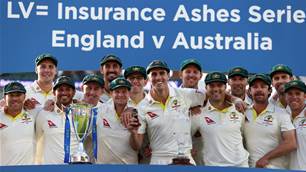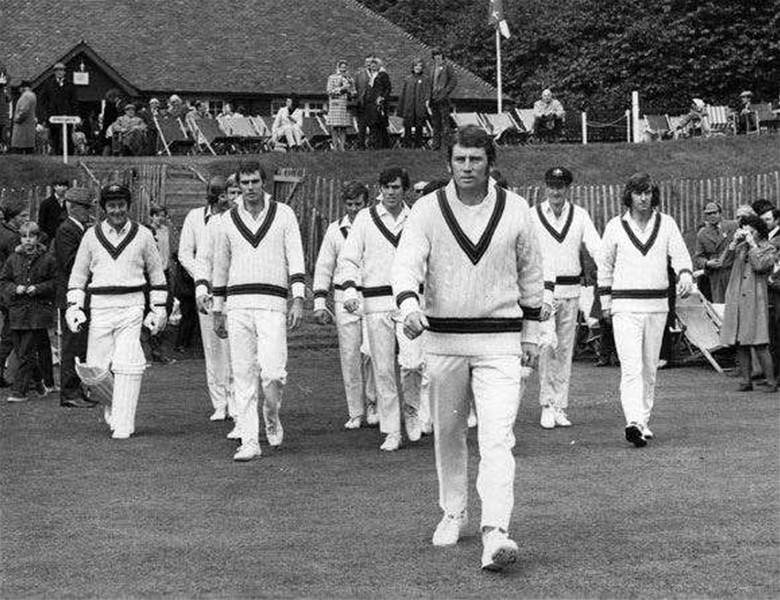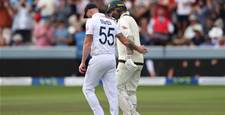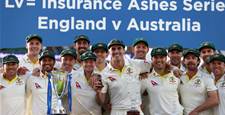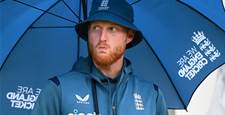Ian Chappell can sometimes sound tough in his criticisms on TV; that’s just him calling it as he sees it.
Ian Chappell can sometimes sound tough in his criticisms on TV; that’s just him calling it as he sees it. But he does show his warm, engaging colours in his new Book Chappelli: Life, Larrikins And Cricket. Both sides of the great man emerged over a few drinks he had with Inside Sport recently.
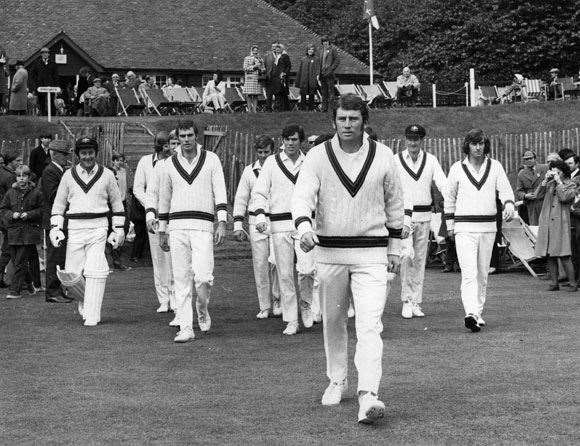 IM Chappell leads the Australians onto the field on the '72 Ashes tour of England.
IM Chappell leads the Australians onto the field on the '72 Ashes tour of England.Image: Getty Images
Whippersnappers among our readers no doubt got an education from the recent Nine TV production of Howzat, seeing the figure of Ian Chappell removed from his network regalia, where he has been a fixture over countless summers, and portrayed in the thick of cricket action both on and off the field. What wasn’t fully conveyed is quite how gifted a sportsman he was, and what a superb leader he became. He is sometimes seen as the first of the win-at-all-costs Aussie captains (1971-75), but this impression does him no justice. Certainly he played cricket hard, but he was always the fairest of players, and that concern for a “fair go” was behind his involvement in World Series Cricket back in the late 1970s. It’s a personal style that has won him many friends, many of them his former opponents; these and other significant others are celebrated in his new book, Chappelli: Life, Larrikins And Cricket (Random House). It’s a series of charming recollections of travel, cricket, sport, broadcasting and even running with bulls - with more than a few carousing evenings detailed. Ian, 69, can sometimes sound tough in his criticisms on TV; that’s just him calling it as he sees it. But he shows his warm, engaging colours in his book. And both sides emerge over A Few Drinks ...
I enjoyed your book. When did you find time to write it? I did it two winters ago, actually. I figured I’d need to write it in a winter where I could sit down and have a decent run at it. It’s an idea I’ve had in my head for, oh, 20 years. I’d made all these notes on scraps of paper, and I’d kept the accreditations for all the events I ever went to – sport and concerts and those sorts of things. I’d just thrown them all into this one drawer ... So one day I opened it up and it was a bloody mess. I thought, “Gee, I ought to clean that up,” which I then did. And with all these little scraps of paper and things, I thought, “I should just put them into the computer.” So I started doing that. Then I thought, “I’ll just write one or two of these up as short stories and see what happens.” Next thing I knew I had a book. It’s basically done from memory. It was interesting because it’s a totally different style of writing to what I’ve done in the past ...
No searing critiques this time around? (Laughs) No, I guess I’ve been fortunate in a lot of ways in life. But I seem to have run into a hell of a lot of characters along the way, which I guess you do when you’re having a drink ...
I knew you played baseball and had a passion for the game, but I must confess, I didn’t realise how good you were – SA catcher at the age of 18, and twice an All-Australian in that position ... I was actually selected for Australia at baseball before I was selected at cricket, which not many people realise.
If the career opportunities for young ball players existed then that exist today, with the scouts running their speed guns over our 14-year-olds, is there any chance cricket might have lost you? Would you ever have considered a baseball career? I actually mention this story in my book – I went into my father’s bedroom late at night when I was about 13 or so, and I said to Martin, “I’m going to America to play baseball.” And he told me to piss off and go back to bed. “And by the way, you’re going to play cricket.” So I think that even if the opportunities were around then that are now, I think Martin would’ve still wanted me to play cricket. And at the age you’ve really got to go to America to have a chance of succeeding, at 16 or 17, I think I would’ve still listened to my old man, rather than tell him to jump in the lake.
Were you always sure you’d be a professional sportsman? Did you ever have any choice in your career path? I’ve never really considered myself as that. Certainly, with the amount of pay on offer, it wasn’t going to earn you a living ...
I suppose “career path” was a bit strong back in the early ’60s ... Yeah. I never played county cricket because I didn’t want to be playing every day of the week. I can remember at about 17 or 18 walking around home. Martin had a cricket ball in his hand, it was about August. He tossed the ball to me and said, “Here, bowl me a wrong ‘un.” And I tossed it back and said, “Piss off, Martin. It’s August and I’m playing baseball. I’ll bowl you a wrong’un come the end of September.” So I always liked that thing where I was playing baseball for about six months of the year and cricket for six months. As far as actually playing for Australia, I’ve often said I never actually thought about playing for Australia until I was virtually picked. Even after a couple of years of Sheffield Shield cricket, and you’re playing against Test players in those days pretty regularly, and even though I had a bit of success against blokes like Benaud and Davidson and guys like that who’d played for Australia, I still wasn’t thinking, “I’m definitely going to play for Australia.”
You were a catcher – but never wanted to be a wicket-keeper? Yes, standing back ‒ never standing up. I kept a couple of times for Australia, just to give Rod Marsh a rest – we didn’t take a second ‘keeper to New Zealand in ‘73/74, and I kept once for SA when the ‘keeper got injured. And I actually kept in schoolboys once – we had a fellow called David Sincock, who actually played a handful of Tests for Australia, but he was a huge spinner of the ball. He spun the ball as much as Shane Warne, only difference being he spun it that far both ways. Warney was big from the leg, but not his wrong ‘un, but David spun it a huge amount both ways. I was at first slip in those days and the ‘keeper was having a bit of trouble, and the coach asked me, “Can you pick David?” And I said, “Of course I can pick him, yeah.” And he asked, “Well, can you tell the ‘keeper when the wrong ’un is coming?” And I said, “By the time I get the message to him, it’s going to be a bit late.” And he said, “You keep then.” And I said, “Christ no, I don’t want to keep.” Anyhow, somehow he railroaded me into it ... As I say, I didn’t mind it standing back, but once I got up to the stumps and you’ve got a bat flying around your head, I lost all interest there. And also, I always wanted to be a batsman, and ‘keeping didn’t figure into that.
You make the confession in your book that it was you who actually taught Doug Walters how to smoke his first cigarette: you appear to have been a very good teacher ... Ha. No, Dougie was a fast learner.
How much better do you reckon the players of that era might’ve been if they did all the fitness work that today’s professional players go through? I don’t think it would’ve been any different, really. You know, Warney’s been a smoker the whole time he’s played. And I think you’d get quite a shock if you realised how much fitness work some of those guys did back then. But they did it in the off-season. I know I did a hell of a lot of running. Dennis Lillee got a shock one day when he went on a training run on a tour of England, and I said, “Hang on, I’ll come too.” He looked at me a bit strangely, but told me afterwards he’d thought to himself, “I’m going to burn this bastard off because he’s just a bloody batsman and he’s not that fit.” He said he got a hell of a shock when I stayed with him. When we finished, I was only a couple of yards behind him. He said, “I looked at you a bit differently after that.”
That’s cardio training: did you ever see any other players from your day lift anything heavier than a cricket bat? No, weightlifting wasn’t a thing ... I think Dennis started doing it at some point in his career.
There’s a dilemma now working out how much bowlers should bowl – whether they should be rested or rotated or whether you just pick the best available at any time. What’s your take there? I’m not sure there’s a simple answer, but I was talking to (brother) Greg about this the other day and he said that one of the things they’re getting right is they’ve discovered that if a bowler just bowls in T20 games and then goes straight into a Test match, going from a small workload to a heavy workload, it’s almost a guarantee of injury. And I think that might be part of the reason they’re saying Pat Cummins isn’t going to play until the third Test match.
And they brought Shane Watson back from the T20 Champions League before the end ... Yeah, to try and build up a bit of a load ... I think that’s a bit of a nonsense. On two counts: Cricket Australia says it’s doing it in the best interests of the Australian cricket team and the best interests of Shane Watson. Well, I don’t understand how it can be in the best interests of Shane Watson, because anybody who’s a competitor – and Shane is certainly that – doesn’t get halfway through a tournament, plays in the round robin stage, and then stops playing in the knockout stage ... As a competitor, once you start something, you want to try and finish it. And obviously you’re hoping the finish is the final and you want to win it. It’s bad enough if you’re denied by injury. You don’t want to be denied like that ... They’d have been better off stopping him going all together – I think he would’ve preferred that. The other thing is, I think he’s such a good opening batsmen, that’s where I’d be batting him ... I had a blue with Greg once at the Adelaide Oval when I took him off after he’d bowled four overs, and he said, “Bloody hell, how do you expect me to get wickets in four-over spells?” And I said, “Well mate, you’re in this team to make hundreds and bat at number four – you’d better find a way to get a wicket in four overs because that’s all you’re going to be bowling. I’m not going to do anything to detract from you making hundreds.” And I think Shane Watson is a better bowler than Greg, but that’s how I’d be using him – four overs here and maybe four overs a bit later in the day. You only need to get eight or ten overs out of your fifth bowler anyway – the other blokes can bowl 20 overs each, so there’s your 90 overs.
How is Michael Clarke shaping up as an Australian captain? I think he’s pretty good. I didn’t ever think there’d be a problem tactically from the little bit I’d seen him captain, and having seen him as a young bloke when he was at the academy. He captained a bit there at youth level, and just seeing the confidence he had – he was a good, young bloke, and if you put a bit of shit on him, he’d give it back, but he would do it in a respectful way – never disrespectful. That’s always a good sign – you like to see somebody who’ll mix it up a bit in that regard, and Michael could always do that. The other good sign was he is the sort of fellow I thought would be buoyed by the responsibility rather than be weighed down by it. And his batting has so far shown that he has taken the extra responsibility in his stride. I’ve always said that as a selector, if you’re choosing someone as a captain, you should never choose anyone who you think is going to be weighed down by the job. If they are, then you’re picking the wrong bloke. That doesn’t mean that’s a guarantee that he will continue to succeed as a player, but there are some classic examples. I thought Greg’s best captaincy was when he had his bad trot, because he suddenly realised that you can still make low scores even when you’re trying your backside off. And the same thing with Mark Taylor: when he had his bad trot, it didn’t affect his captaincy – I thought that was a pretty good effort of Mark Taylor’s to be struggling as a player but his captaincy still held up.
Does your intel suggest Clarke has got the respect of his team? I would think so. The Australian system is a good one for that. Australia picks the 11 for the team, and out of that it picks the guy it thinks is best to captain it. So that means under that system, you’ve already earned respect as a player, and hopefully you’ve earned it as a person as well around the team. But then the important thing is that once you’re appointed captain, you’ve got to go on earning that respect as a player and as a person, and then you’ve got the first leg of the trifecta, as you earn respect as a captain and leader. To me, there are always two parts to captaincy: there’s the captaincy which I see as the part you play on the field, and there’s the leadership, which is sort of everything that happens off the field. A lot of what you do off the field, if you do it well, will reap you rewards on the field.
In the latest issue of Inside Cricket, Mickey Arthur says he’s worked out an arrangement with Clarke that Clarke takes care of what happens on the field, and he’ll take care of what happens off it. Well, that’s bollocks.
Your antipathy towards coaches is pretty well-known ... Well, that’s one of the reasons. Okay, I’d immediately turn around to Mickey Arthur and say, “Mate, when the Ws and the Ls start going against your name, then I’ll delegate something that is important to the winning and losing of the game. But until they start giving you the wins and losses, I’m going to do the bloody things that are important to us winning cricket matches.”
That includes the straight talking to players in the team about what’s expected of them? I’ll just give you an example. If a player’s having a problem, say a batsman, and he comes to me as a captain and a batsman as well, and says, “Mate, I’m struggling a bit. Have you got any thoughts?” If I say, “Mate, go and see the batting coach – he’ll sort you out”, that player is entitled to sort’ve think, “What? Doesn’t he give a continental about me?” I’d rather sit with a guy and talk with him – and, okay, I didn’t play in an era with coaches, but to me the best coaches were the other guys in your team, anyhow. If I was struggling with the bat, why wouldn’t I go and talk to Greg, or Ian Redpath, or Keith Stackpole? For two simple reasons: one, they’re playing with me a lot, so they’re the first guys who see if I’m doing something different; and secondly, they’re facing the same bloody bowlers! You know, you work it out like that.
You don’t think those discussions are going on within the team these days? Are players a bit protective of their own positions, perhaps? I don’t know about that. I would hope they’re having those sorts of conversations, but the thing about the game that’s so different now is we sat around and had a beer or two after play. But because they’re playing so much these days and a lot of the cricket is night cricket, I guess the last thing you want to be doing if you finish at 11 at night is sit around a dressing room and chat. I recall the big deal when Bob Simpson was coach and a selector: why would you go to confess some flaw in your technique to your coach when he’d be the one to drop you from the team? So they took the selecting away from the coach – but now they’ve brought it back.
Should a coach be a national selector? I don’t agree with it, and that’s one of the reasons. But I also don’t agree with the captain being a selector, either. I used to think he should, but then I had a chat with Richie about it one day – this was probably back when I was playing. And once he explained his thoughts on it, I changed my mind a bit. One of the reasons he put forward: if you want a bowler and you get him into the side, there might be a tendency then for you to bowl him to prove your judgement was right, rather than bowl the person who was the best guy to get a wicket at that stage. Which is what you should be doing as a captain. I acted as selector when we were on tour – and I mean, it’s not that bloody difficult. And I think a captain should have an input – I just don’t think he should have a vote. If you were doing it all the time, as Michael Clarke has to do, you’re going to be in situations where you’re going to have to make tough decisions, and I just think it’s an extra thing that could cause friction within the team that you don’t need to put on the captain. There’s enough things that can happen that can cause friction in a team without adding another one to the list.
You mentioned you should pick your team, then pick your captain – you don’t like the idea of picking a captain and building a team around them, do you? I’ve seen what you’ve written about George Bailey captaining the T20 team ... That’s a ridiculous selection. If Australian cricket has got to the point where we’ve got to pick a captain first and pick the other ten around him ... It’s created problems already, I think. Not just in T20, where in that recent competition in Sri Lanka, having George in the team created some problems in the batting order – it meant Hussey got left out, and I reckon he’s one of the better T20 players around. But now they’ve also started to pick him in the one-day side, which I think is purely to justify their selection of him as captain in the T20 side. And now I’m starting to read that he’s one of the next players in line for the Test side – well, come on, give me a break. It’s interesting that everyone I talk to – and that’s current players and some others who have finished not all that long ago – all say the same thing: George isn’t a good enough batsman to play for Australia. Anyhow, that’s been my opinion right along.
I suppose they’re looking at the beaut results Tassie has had in the last couple of years and seen a steady captaincy hand there ... Well, the problem with that is, it’s not the Sheffield Shield competition that I played in – and that’s not to denigrate the current players. But it’s to make the point that the system I grew up in – there were eight Shield games in those days and you would definitely play five against the Test players and probably six. This year’s going to be a bit of a rarity because the Test players are actually going to play a couple of Shield games. But generally the Test players rarely play Shield games. So to judge players on Shield cricket alone, you could make a mistake. I just think if that’s what they’ve based their judgment on, I’m not surprised they’ve made a mistake.
Do you actually like T20 cricket? It’s like any sport: if it’s played well, it’s enjoyable.
So you’d pay to watch it? If you weren’t paid to commentate on it? Ah, well, that’s a difficult question. I’m not sure I’d watch any cricket if I wasn’t commentating. I’m not a great sports watcher. I mean, the only sport I can sit and watch at the ground is baseball. But any other sport, I’d rather be playing than watching. Certainly, that’s the way I’ve always felt. If I’d stopped playing and didn’t commentate, and had a job as a barman or whatever, if I was going to go to the cricket, I’d go along to watch someone. If someone said, “Oh, there’s this young kid called Ponting who looks like he can really bat, or this young leg spinner called Warne who looks alright”, I’d go to the cricket to have a look for myself and make up my own mind whether I thought he could bat or bowl. But to actually sit there and watch all day ... so maybe I would be better suited to a 20-over game. The problem I have with the 20-over game is, I would hate to be a middle-order batsman. Michael Clarke, for instance, in that first World T20 in South Africa; in the whole tournament I think he faced four balls. It takes my mind back to school days. I was fortunate I didn’t have to worry about this, seeing I could play a bit, and you usually opened the batting and opened the bowling, so you’re always in the game. But you think to yourself: it’s no wonder a lot of kids say “stuff cricket” if two guys are out there making all the runs, and the same two guys do most of the bowling, and all I’m doing is running around in the field chasing balls. I can imagine it wouldn’t have been much of a game. If I was a middle-order batsman in T20, and you faced a couple of balls here and there ... and the worst thing is you’re having to come in and try and slog ’em out of the ground and you hit the first one up in the air and you hole out, and then all you do is run around in the field for 20 overs, I’d be thinking to myself, “This ain’t much of a game.”
But what about baseball? You might be lucky to get your bat on the ball in a whole nine innings? Well, I can actually remember saying that to myself. In one of the last one-day international matches I played, I was batting at six and I came in with a dozen balls to go, so I had to get on with it ... I mean, you give your wicket away often enough without being forced to give it away. And I tried to slog one and it went straight up in the air and of course I was caught. And I remember as I was walking off, because television was just starting to come into the game much more, I would always put my gloves up to my mouth because I was usually calling myself all sorts of things, like “you silly bastard”, or something worse. So I put my gloves up to cover my mouth, and I said, “If I wanted to slog every fucking ball, I’d be playing fucking baseball!”
Related Articles
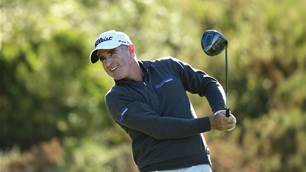
Video interview: Drinks With ... Matt Millar

How to watch the Australian Open
